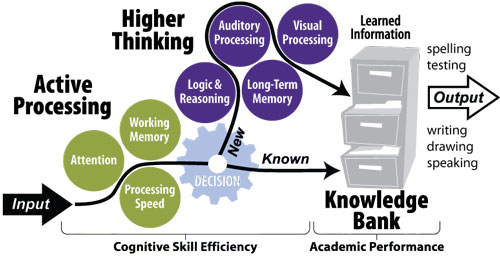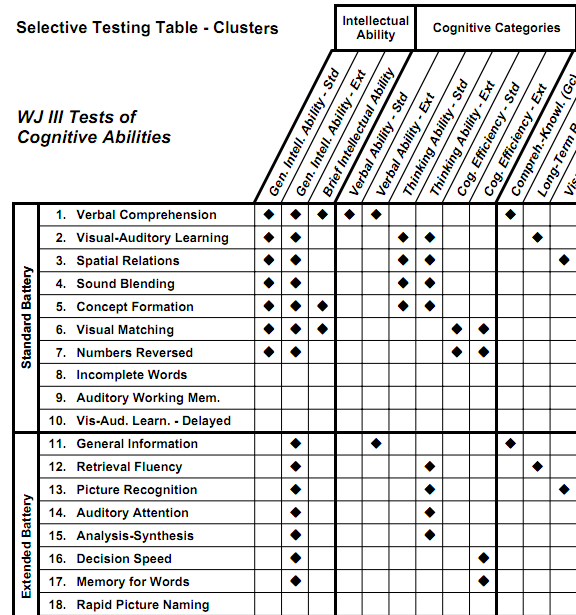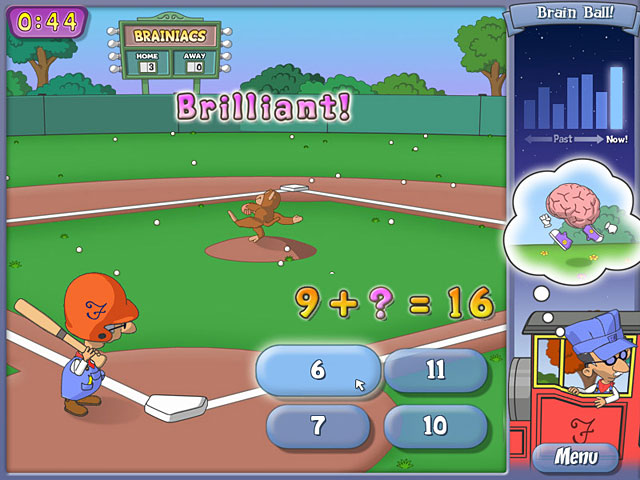LearningRx – A Brain Training Center Near You
A reader shared an experience they had with LearningRx a consumer center for brain training. They promise to improve your academic performance by providing coached training on a full range of cognitive skills (see diagram).
The process starts with a formal assessment using the Woodcock-Johnson assessment for cognitive abilities (partially shown below).
You are then matched with a coach and work 3-5 days per week for an hour a day for 3 months. They claim a 3.6 year improvement on the cognitive assessment and have some studies to back it up.
LearningRx has centers across the US and they want to open more using a franchise approach. Interested to hear from other readers that have used this service.
Categories: Child, Cognitive Development, College Student, Memory and Learning, Mental Focus, Perception, Training Tags: brain training
Action Video Games Work Mental Muscles Big Time
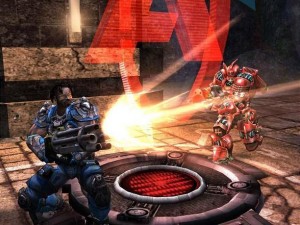 Multiple experiments done by Daphne Bavelier, professor of brain and cognitive sciences and her group at the University of Rochester, strongly suggest that action video games improve perception (speed and accuracy), attention (including multi-tasking), decision-making and other aspects of cognition.
Multiple experiments done by Daphne Bavelier, professor of brain and cognitive sciences and her group at the University of Rochester, strongly suggest that action video games improve perception (speed and accuracy), attention (including multi-tasking), decision-making and other aspects of cognition.
That is an amazing workout for the brain especially if you are getting it by having fun. The key is to play a game that is first-person and includes a lots of action or visual-motor coordination. My favorites are Geometry Wars and Soul Caliber 4.
Interested to hear from readers that play action video games. Which games do your play? Can you feel them working your mental muscles?
Categories: Decision Making, Memory and Learning, Mental Focus, Perception, Software Tags: brain training, games
Does Teasing Your Brain Make it Stronger?
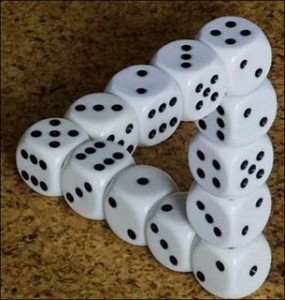 There is some evidence that we can enhance our brain function and cognitive performance by regularly solving puzzles, problems, riddles or games that tease our brain. Teasing means presenting some enjoyable mental challenge that is not too easy but not too hard.
There is some evidence that we can enhance our brain function and cognitive performance by regularly solving puzzles, problems, riddles or games that tease our brain. Teasing means presenting some enjoyable mental challenge that is not too easy but not too hard.
Classic crossword puzzles and the more recent Sudoka number-pattern puzzles are popular brain teasers. Some people love them others find them boring.
The key is to find the type of brain teaser you enjoy and enjoy it regularly.
If you have not discovered your inner brain teaser, or are shopping for new ones (always a good idea), check out Top 10 Brain Teasers and Games for Adults and Kids from Sharpbrains. You are sure to find something you like. If you do, the next challenge is find a steady supply of similar challenges.
Very interested to hear from readers that enjoy brain teasers. How do they enhance cognitive function?
Image Source: Fanpop!
Categories: Cognitive Decline, Lifestyle, Mental Focus, Perception, Problem Solving Tags: games
Slow But Steady to Win Brain Health Race?
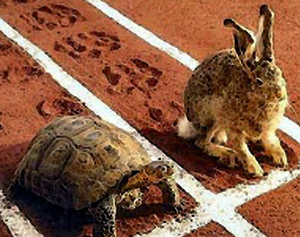 Making small changes to our daily activities can make a big difference over the years. Often called lifestyle tuning, this approach can be applied to build brain health and improve your cognitive performance. We have covered many tunning techniques on the Next Brain Blog.
Making small changes to our daily activities can make a big difference over the years. Often called lifestyle tuning, this approach can be applied to build brain health and improve your cognitive performance. We have covered many tunning techniques on the Next Brain Blog.
Posit Science, a leader in brain training software, offers 14 Brain Training Tips. They range in change magnitude from walking on rough surfaces to eating fish and learning to play a musical instrument. Here are the ones that are easy-to-do lifestyle tuneups:
4. Exercise Your Peripheral Vision
13. Walk on a Cobblestone Path
Although we don’t have research that proves lifestyle tuneups produce lasting improvements in brain health and cognitive performance, we do have such research for cardiovascular health. For example, taking stairs instead of an escalator or a 10 minute walk does in fact improve heart health. My bet is that analogous lifestyle tuneups for the brain will improve cognitive performance.
Interested to hear about your techniques for taking a slow but steady approach to the changes needed to improve brain function and cognitive performance
Categories: Diet, Lifestyle, Mental Focus, Perception Tags: brain training, cognitive fitness, exercise
Mental Training Techniques of Top Athletes
Top athletes are not only physically fit but also mentally fit. They use mental training routines just as they use physical training routines. Fortunately, many if not all of their mental training routines can be used to improve brain function or enhance cognitive performance in non-sports related contexts.
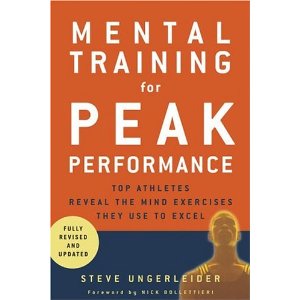 A great resource for exploring these techniques is Steven Ungerleider’s book, Mental Training for Peak Performance. He offers an introduction to mental training and then covers specific techniques including affirmations, self-talk, breathing, mediation, mental snapshots, guided-imagery, visual rehearsal and even dreams. We have covered many of these techniques in the Next Brain blog, but Dr. Ungerleider brings refinements and deeper insights to nearly all of them.
A great resource for exploring these techniques is Steven Ungerleider’s book, Mental Training for Peak Performance. He offers an introduction to mental training and then covers specific techniques including affirmations, self-talk, breathing, mediation, mental snapshots, guided-imagery, visual rehearsal and even dreams. We have covered many of these techniques in the Next Brain blog, but Dr. Ungerleider brings refinements and deeper insights to nearly all of them.
Take for example the use of guided-imagery. This is a technique involves forming vivid mental images and controlling them to practice “in your head” and manage anxiety and performance stress. Ungerleider’s approach stresses understanding how the individual experiences the image – sight, hearing, touch and feel. Other approaches I’ve seen assume we experience images with sight only. He has even developed a Sport Imagery Questionnaire (pgs. 56-57) to help you figure out how you experience images. You assess yourself in four different situations – practicing alone, with others, watching a teammate and competing – and rate how you experience images (1-5) in terms visual (what you saw), auditory (what you heard), kinesthetic (what you felt) and mood (how you felt). You use the results to customize routines for generating and controlling vivid imagery.
I completed the questionnaire and was surprised to find that mood played a key role in how I experience mental imagery. I used this to change my approach to guided-imagery with some good results.
Interested to hear from readers about their experience using the mental training techniques inspired by sports.
Categories: Books, Manage Emotions, Memory and Learning, Mental Focus, Perception, Training Tags: sports
How Visually Change Blind Are You?
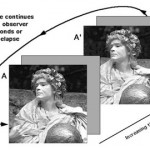 Found an interesting cognitive neuroscience demonstration on Go Cognitive designed to let you test yourself in the change-blindness paradigm. Change blindness involves making significant changes in a visual scene that go unnoticed.
Found an interesting cognitive neuroscience demonstration on Go Cognitive designed to let you test yourself in the change-blindness paradigm. Change blindness involves making significant changes in a visual scene that go unnoticed.
The demo is fun, gives you a number of scenes to work with and lets you control some key parameters. Experiment a bit, especially with the strategy you use to detect changes. Try defocussing your eyes and looking at the images globally to detect a difference and then try systematically comparing the images item by item. Which gives you a better score?
Categories: Perception, Software Tags:
The Amazing Brain Train
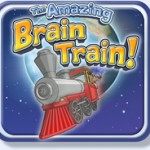 A playful way to do a little brain training using games: “Fueled by your mental energy, Professor Fizzwizzle’s Brain Train will take you on a brain-boosting adventure!
A playful way to do a little brain training using games: “Fueled by your mental energy, Professor Fizzwizzle’s Brain Train will take you on a brain-boosting adventure!
Put your mighty mind to the test and see how far you can go!”
15 online games for training your brain in planning, memory, spatial reasoning and numbers all for $6.99 or free for 24-hours. For a quick look check out this video.
Categories: Child, Memory and Learning, Mental Focus, Perception, Software Tags: games
Mental Fitness Cards that Really Work
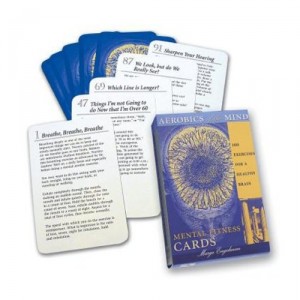 Couple of years ago I bought a pack of Mental Fitness Cards and started to experiment with them. You get 100 cards that provide very specific activities designed to maintain or even enhance the senses, memory, problem solving, linguistic abilities and numeracy. The cards come in a nice sturdy box and include a booklet that provides an overview and suggestions for how to use the cards.
Couple of years ago I bought a pack of Mental Fitness Cards and started to experiment with them. You get 100 cards that provide very specific activities designed to maintain or even enhance the senses, memory, problem solving, linguistic abilities and numeracy. The cards come in a nice sturdy box and include a booklet that provides an overview and suggestions for how to use the cards.
The cards are geared for seniors but I have found 12 that appear to be very useful in general.
One of my favorites is #91 Sharpen Your Hearing. The activity involves turning the volume down on your TV or talk radio show until you can hear but no longer make out what is being said. You then slowly turn it up until you can just barely but clearly hear what is being said. When you repeat this you should not have to turn it up as much to get words because you are learning to focus your hearing. The card talks about drawing lines a on sheet of paper to measure progress. I did not track with that but do it in the car where my radio gives me a number for the volume setting. This way I can measure progress exactly. I am not recommending that you do this in the car.
I am interested to hear from readers about other card-based mental fitness products and how they are using them.
Categories: Books, Cognitive Decline, Memory and Learning, Older Adult, Perception Tags:
Develop Your MOT – Multiple Object Tracking Skills
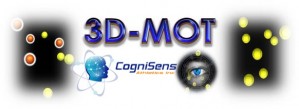 CogniSens Athletics is a small company dedicated to translating the latest neurophysics into tools for improving the cognitive performance of athletes. They just announced the release of 3D-MOT a three dimensional (3D) immersive training environment for developing the cognitive skills needed for multiple object tracking (MOT). It uses a computer and specialized goggles to teach you how to visually track more than one moving object at a time. A key cognitive skill in sports. To quote a news release:
CogniSens Athletics is a small company dedicated to translating the latest neurophysics into tools for improving the cognitive performance of athletes. They just announced the release of 3D-MOT a three dimensional (3D) immersive training environment for developing the cognitive skills needed for multiple object tracking (MOT). It uses a computer and specialized goggles to teach you how to visually track more than one moving object at a time. A key cognitive skill in sports. To quote a news release:
“D-MOT is a scientifically designed system for improving perceptual tracking skills by expanding an athlete’s capacity to absorb and process complex movement information. … players have shown that just one hour of distributed 3D-MOT stimulation yielded an average of over 50% increase in capacity to track at speed, with greater increases being realized with extended training. ”
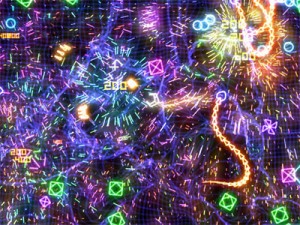 Most of us won’t have the opportunity to use such technology but I wonder if there is not more generally available options that produce some of the same effects. My guess is that some video games are an example.
Most of us won’t have the opportunity to use such technology but I wonder if there is not more generally available options that produce some of the same effects. My guess is that some video games are an example.
Consider Geometry Wars. Definitely need to be able to track multiple moving objects at once to get anywhere with this game. Indeed, in playing it, I have had to learn to defocus my eyes to increase my score. Most likely a sign that I am learning a new perceptual skill.
I am interested to hear from readers about examples of video games or other methods that can help us develop MOT (multiple object tracking) skills.
Categories: Mental Focus, Perception, Software, Training Tags: cognitive fitness, games, processing speed, sports
Tai Chi for Cognitive Training?
Tai Chi is an ancient Chinese practice for linking mind and body in a martial art. Today it is a low-impact form of exercise and wellness that may improve a number of cognitive functions including mental focus, memory, managing emotions and perception.
Tai Chi involves a series of fluid, slow-paced motions and stretches that have been described as “meditation in motion”. The benefits of Tai Chi have just started to be formally studied. An in depth article on the Mayo Clinic website, Tai Chi: Discover the many possible health benefits, reports there is preliminary evidence for these benefits:
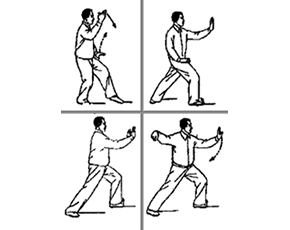 Reducing anxiety and depression
Reducing anxiety and depression- Improving balance, flexibility and muscle strength
- Reducing falls in older adults
- Improving sleep quality
- Lowering blood pressure
- Improving cardiovascular fitness in older adult
- Relieving chronic pain
- Increasing energy, endurance and agility
- Improving overall feelings of well-being
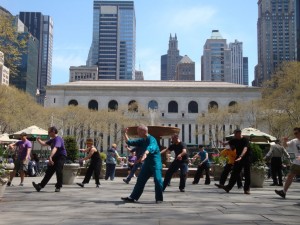 Clearly these benefits go beyond improving brain function and cognitive performance. Getting started in Tai Chi is not hard. There are many fine resources available for little cost. You can produce results in as little as 8-12 weeks.
Clearly these benefits go beyond improving brain function and cognitive performance. Getting started in Tai Chi is not hard. There are many fine resources available for little cost. You can produce results in as little as 8-12 weeks.
Check out this 5 minute free video for a decent introduction. It won’t make you an expert but it should be enough to determine if you want to try more. There is a product pitch but it is soft.
I am interested in readers’ suggestions for resources for learning Tai Chi, especially those that emphasize improving brain function and cognitive performance.
Categories: Ancient Ways, Manage Emotions, Memory and Learning, Mental Focus, Perception, Training Tags: cognitive fitness, embodied cognition, exercise

